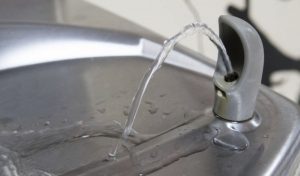March 17, 2019
By: Dwayne Page
The DeKalb County Board of Education has begun testing for lead levels in drinking water at the schools.
Under a new state law, which went into effect January 1, drinking water at all schools built before 1998 must be tested. The school board must also implement a program to reduce potential lead contamination found in the drinking water.
The new law further mandates that if results of a lead test exceed a certain level (twenty parts per billion), the school district must remove the water source immediately and then notify the health department within 24 hours.
School officials also have to notify parents by letter of the affected school and retest the water source three months after correcting the issue.
Director of Schools Patrick Cripps said DeKalb County High School (built in 1963) was the first of the five schools to be tested last month. Samples from forty six water outlets used for human consumption (water fountains in hallways, teacher lounges, and kitchen and culinary arts faucets) were collected and sent to a certified drinking water laboratory for analysis and all but three passed the test.
“The three taps sampled had results greater than or equal to the action level of twenty two parts per billion per state regulations but none of these are in a place where students use them on a daily basis. One was a water fountain in a portable building behind the school that is not in use and students are not present. Another was a water fountain near the boy’s locker room in the gym that is not in use and has been shut down for several months. The third was a Culinary Arts kettle pot faucet,” said Director Cripps.
The taps will remain turned off until they are replaced or permanently removed.
Director Cripps praised the School System’s Maintenance Team especially Aaron Young for their work on this project.
“Aaron did a fantastic job and we are happy with the results. He has been ahead of this from the get-go. Since the law was passed, he has been researching and taken it on and been spot on with everything,” said Director Cripps.
Young said there could be a simple fix for the outlets that tested high.
“The drinking fountains have filters and there could be particulates stuck in them causing the problem. We can open those up and clean them out. As for the kettle pot faucet, it is usually used for cleaning the kettle but could be used for adding water to the soup or whatever that may be cooked but that too is not a difficult fix. We will do further testing in the near future,” said Young.
The tests must be conducted at least once every other year.
DeKalb Middle School and Smithville Elementary School are to be tested next.
“Our School system is committed to protecting the health of students, teachers, and staff. The system will conduct further testing in all schools in the coming months,” said Director Cripps.
While the major source of lead exposure for children in Tennessee is lead-based paint, lead in plumbing fixtures can add to a person’s overall exposure. Lead exposure from tap water comes from the decay of plumbing or the solder that connects pipes, and the risk is higher in older buildings.
Key points from the law are:
- The legislation took effect January 1, 2019.
- All school districts must develop a policy to test drinking water sources in schools for lead.
- Testing is to occur in schools constructed prior to January 1, 1998.
- If results are greater than 15 parts per billion (ppb) but less than 20 ppb, the school shall conduct testing on an annual basis until retesting confirms the level is less than 15 ppb.
- If results are equal to or greater than 20 parts per billion: ◦The drinking water source must be removed from service.
◦The Department of Health and other state agencies will be notified within 24 hours.
◦The school must notify parents and guardians of students within 5 business days.
◦Retesting of the lead level of the drinking water source must occur within 90 days of any corrective action.




